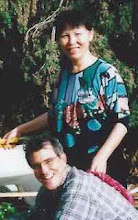Global Civilizations
The intent of this blog was to show my progress studying the content of the Global Civilizations curriculum I helped produce in 1992. I expected to update it with current examples from my life as time went on.
About Me

- Name: John and Lee Perazzo, Las Vegas, Nevada
- Location: Las Vegas, NV, United States
We have been gardening together since the fall of 2001. John sifts the soil and Lee grows the greens. We prefer greens and roots in the winter and harder stemmed veggies in the summer such as peppers and cucumbers. John looks after his worms and tumbles compost. Lee tracks the seeds and the work schedule here in the northwest Mojave Desert.
Saturday, May 19, 2012
Blog navigation. Why am I not able to click forward (or backwards) from any particular blog post? I can only go "home" and then choose from there.
Sunday, May 06, 2012
Agents of Culture Change
Melanesians and Missionaries: An Ethnohistorical Study of Social and Religious Change in the Southwest Pacific by Darrell L. Whiteman (William Carey Library, 1983)
Now, I am revisiting the text in terms of directed culture change. I am shocked that other texts on culture and change (such as Larry L. Naylor, Culture and Change: An Introduction. Greenwood, 1996) do not include this as background to their studies. Where else has this seminal work been overlooked?
So, in terms of general Anthropology, this text is basic for directed culture change. In terms of practical Anthropology, this book is important as change agents do not operate without the give and take of the culture in which they are immersed. For missiology, this is a fundamental study. For the history and culture of the Melanesian people(s) in the South Pacific over the last 150 years, you will not find a more comprehensive overview with detailed notes and bibliography.
Directed Culture Change
I am hoping to find a better text than this, Culture and Change: An Introduction. What ever the case, the text will likely have to answer to the basics presented here.
I was immediately concerned about the ethnocentrism of the author when it was stated, "Because people are always looking for something better, more efficient ways of doing the things they feel they but do, change is inevitable." Is this a universal motivation across cultures and times? For example, could it be applied to the Amish? Is their search for water and land considered something "better"?
Again, I am limited to the introduction in my brief exposure for review, but I was heartened by the author's acknowledgement that directed culture change is largely ignored, even in standard anthropology textbooks. I admit my bias that directed culture change has been a part of civilization from the beginning. Could even the creation of civilization itself be considered such an effort?
I was immediately concerned about the ethnocentrism of the author when it was stated, "Because people are always looking for something better, more efficient ways of doing the things they feel they but do, change is inevitable." Is this a universal motivation across cultures and times? For example, could it be applied to the Amish? Is their search for water and land considered something "better"?
Again, I am limited to the introduction in my brief exposure for review, but I was heartened by the author's acknowledgement that directed culture change is largely ignored, even in standard anthropology textbooks. I admit my bias that directed culture change has been a part of civilization from the beginning. Could even the creation of civilization itself be considered such an effort?
Tuesday, May 01, 2012
Right Ascension

Here is a photo of my Solar System Calendar Clock set for May 2, 2012. The blue disk is now properly Venus (and not the moon). The Right Ascension (RA) measurement is reduced to a 12-hour clock and centered on the earth (yellow disk). My RA values were computed from NASA's Horizons ephemeris generator. You can see the right hand portion of my notes under the transparency.
I have also added a line drawing of the same photo for easier printing, if you like.


